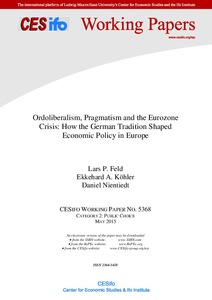Ordoliberalism, pragmatism and the eurozone crisis: how the German tradition shaped economic policy in Europe

Feld, Lars P. ; Köhler, Ekkehard A. ; Nientiedt, Daniel
CESifo - Munich
2015
25 p.
economic policy ; economic recession ; fiscal policy ; monetary policy
CESifo Working Paper
5368
Business economics
English
Bibliogr.
"German policy during the Eurozone crisis supposedly follows an ordoliberal tradition. In this paper, we discuss to what extent this contention holds and to what extent Germany pragmatically responded to different crisis phenomena. A proper analysis of ordoliberal thinking reveals that the European Monetary Union can be justified on ordoliberal grounds as an economic constitution for Europe in which several pillars supposedly aim at ensuring sound money in the Eurozone. The policies the German government pushed during the Eurozone crisis have been informed by the ordoliberal tradition. In particular, this tradition may explain why the German government has been hesitant to support the call for Eurobonds and has only reluctantly established the European Stability Mechanism (ESM). However, the decisions on the ESM and the acceptance of unconventional monetary policy in Europe show that German economic policy largely responded pragmatically to the challenges offered by the crisis."
Digital
The ETUI is co-funded by the European Union. Views and opinions expressed are however those of the author(s) only and do not necessarily reflect those of the European Union or the ETUI.